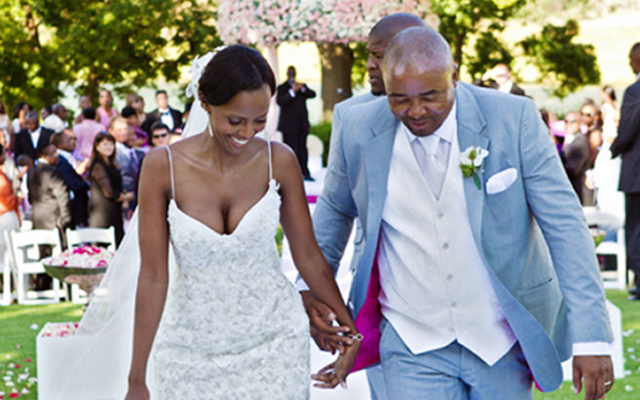A wedding party on New Year’s Eve

Sekai Nzenza on Wednesday
There was a wedding on New Year’s Eve in Harare. No, I was not related to the groom or bride. In fact, I had never met them before. The groom was the son of the landlord where my cousin Piri lives in Highfield. When Piri invited me to the wedding, she said it was fine for me to attend because this was not a European-style type of wedding where you only go because you have an invitation card.
“What if the whole of Highfield comes to the wedding?” I asked. “How will they feed them?”
“Of course the whole of Highfield will try to attend the wedding and share the joy and the food. But the reception is too far for those without cars to attend,” said Piri.
And so we all dressed up for the wedding. The church service went on for three hours. The groom and bride belong to the newly-formed happy gospel churches where they are young and preach mostly in English. The theme colour of the wedding was orange and black.
There were four brides maids in orange and four grooms men accompanied by four little boys in black suits and orange shirts, and the five little girls in orange taffeta dresses looked so beautiful. All the little girls had various straightened hair styles including long weaves and extensions. They all wore medium high heeled little white shoes. A tall guy in a white suit and orange shirt played on the big piano in the corner and another guy played the accordion. There was plenty of dancing, singing and guitar playing. There were no drums, mbira or any of the village type instruments.
After the long church service, we were given directions to a reception hall quite a distance outside town, in a bush like setting. Many people who were in church did not make it to the reception because there were not enough cars to ferry people. “You will see, there will be plenty of food for everyone who gets transport to the reception,” Piri reassured me.
We waited at the reception grounds for two hours for the bride and groom to arrive because they had gone for a romantic photo shoot in Harare Gardens and also in other nice romantic looking settings around Harare where there was no rubbish or potholes. While we waited at the reception hall, sitting on rocks, Piri kept on sneaking back to the car to get some beer and wine in plastic cups. This was a no alcohol wedding. Then we made friends with other guests and friends who were also hiding their alcoholic drinks in plastic cups while holding bottles of soft drinks and mineral water.
“It’s New Year’s Eve. Tomorrow, we meet 2015. So why should we not drink and be merry the way we used to do back in the village?” Piri said.
“Ah, taura hako hama yangu,” said one elderly lady, meaning, speak my relative, speak. The lady said she was the oldest aunt or tete of the groom. She wore a hand sewn orange suit. Her feet were cracked and her hands looked so rough from hard work in the village. “When I got married in the village, back in 1962, my wedding was full of joy. People ate, drank and danced. It was not like this, where nobody even knows that I am here. Not like this, where you hide the joy of drinking beer at a wedding.” Tete shook her head and sipped from a plastic bottle of orange juice.
I then recalled one time in the village, long before independence, when we had a wedding. The bridegroom, Bhudhi Robson, was my cousin. Bhudhi Robson’s bride was Emeri from Chiweshe, a place way past Salisbury. Emeri was going to be our first sister-in-law, our muroora.
For days we went down to the river and scrubbed ourselves so that by the time of the wedding, there would be no one with cracked feet or man’a among us. My grandmother, Mbuya VaMandirowesa, said the whole village courtyard should be absolutely spotless and free of the odd chicken or goat poops. Cleanliness was also a message to Muroora Emeri. Once the wedding was over and she had done what was needed to be done with her husband, then the sun should not rise before she did. Her job was to keep the village courtyard clean as every muroora should.
The day before the wedding, a whole beast, a goat and several chickens were slaughtered while we went down to the river to climb the mukute trees to collect the thick and wide fleshy leaves for use as plates during the wedding.
On the wedding day, the lorry from Chiweshe came with the bride, her aunts, sisters and the extended family. The Chiweshe people were singing and carrying the bride in a white wedding dress and a veil. She was accompanied by three bride’s maids in bright pink long dresses.
They sang the song we all knew very well: “We have brought your muroora and her blankets.” Tauya naye muroora nemagumbeze. We all joined in clamouring to get closer so we could see how beautiful Muroora Emeri was. Bhudhi Robson looked tall and handsome in his black suit, white shirt and black bow tie. He was accompanied by three of his work friends from the police force, all dressed like him. We had never seen such clean looking men in one place. They looked just like the European Native Administrator who was based at Enkeldoorn, now called Chivhu.
Suddenly, a bearded strong looking man playing a drum sprang into the middle of the circle singing a mocking song, saying our family did not deserve Emeri because we were paupers. “Munomuchemera munomupei marombe.” Mocking in jest was all part of the bride’s introduction to her new family. Our choir master, Mr Muchando, headmaster from St Columbus School, said we could not be beaten in the wedding mocking and jeering contest. He led us in the song in which we sang that Emeri loves dog intestines and we do not have the pot to cook them in: “Emeri anochemera hura hwembwa, tinohubikira pai?” We sang in a single file doing footsteps in rhythm to the song.
Emeri listened to the meaning of the song and burst into tears. The more she cried, the more we sang and danced. Then we changed the song to another mocking one telling her that if Robson had not chosen her for marriage, she would have been married by a baboon in the mountains: “Dai pasina Robson wedu, wainoroorwa negudo remugomo!”
Beer frothed in big clay pots and the adults drank, sang and danced. We ate so much beef, chicken and rice. Then we danced to gramophone records alternating with the drum. After many hours, the Chiweshe group then gave their thanks and asked their munyai or go between to announce that a bigger wedding to surpass our village one was waiting for us in Chiweshe, the very following week. They left Emeri, her sister and her two aunts.
Just before sunrise, Emeri wore a long dress, covered her head with a doek and we saw her sweeping the whole courtyard assisted by one of her aunts. Gone was the bridal coyness. Here was our new muroora, strong and ready to work and cook for us forever. We inspected her body, the way she walked, talked and smiled. We made comments about her big bottom and the thickness of her legs. “With those hips. She was fertile for sure,” we whispered.
We sat back against Mbuya’s kitchen hut waiting for Emeri and her team to serve us. We were Robson’s sisters and therefore Emeri’s husbands. It was tradition. Not only had she married Bhudhi Robson, she had married us as well.
That village wedding between Bhudhi Robson and Emeri happened so many years ago. In those days, city based people came back to the village to get married in the groom’s village then moved on to repeat the ceremony in the bride groom’s village. Not anymore.
“Some people think a village wedding is uncivilised because it reveals too much poverty and drunken relatives,” said Piri laughing. The groom’s Tete from the village, Piri’s new drinking partner, asked to share Piri’s beer. We offered her beer in a plastic cup. After all, we were here to celebrate a wedding. Besides, in just a few hours later, we expected the year 2015 to arrive promising good dreams, plentiful harvests and new surprises.
By the time the bridal group arrived from the photo sessions, some of us were more than ready to celebrate more and welcome them. Piri and the groom’s aunt danced the most, though they claimed beer had nothing to do with their village style rhythmic energetic dance.
Dr Sekai Nzenza is an independent writer and cultural critic.








Comments